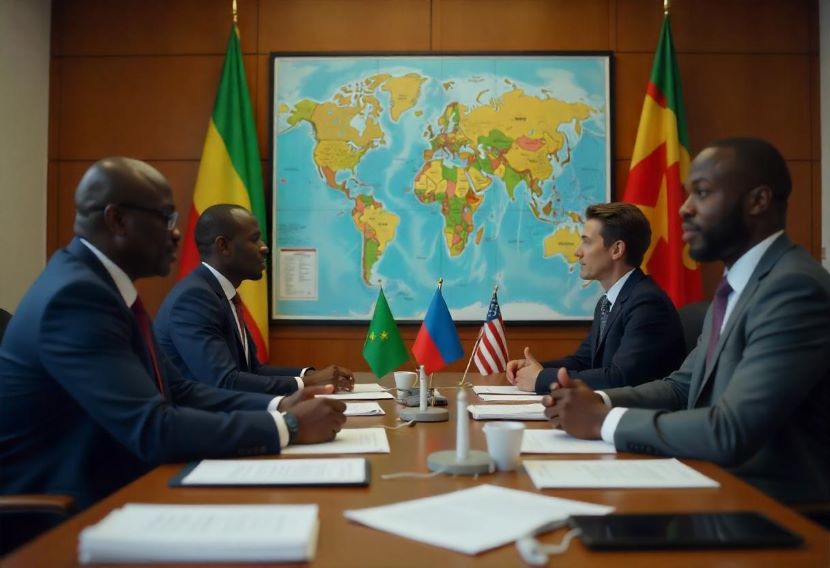Saturday, July 12th, 2025

The US Trump administration has introduced new policies that affect the visa process for different African countries. The policy, which begins in July 2025, currently applies to limiting most non-immigrant and non-diplomatic visas issued to citizens of Cameroon, Ethiopia, Ghana and Nigeria to three-month validity. Renewals to US visa policy from previous visa policies were low, and we issued multiple entry visas that could lead to longer lifespans, for example, conditions of up to two years or more.
Policy changes are part of a broader US effort to amend visa policies to better adhere to the principles of visa interaction, and the visa conditions imposed on citizens from such countries are the same as those imposed on US citizens. The US State Department said the new regulations aim to streamline security, address issues related to visa tenure, and further harmonize with other countries' visa policies.
Background of policy changes
This visa policy change aligns with the US policy approach that seeks to overhaul immigration policies to ensure that foreign diplomatic relations remain healthy and intact. Donald Trump's administration has focused on reconsidering countries that have historically benefited from Laxer Visa's policies for countries with focus on security and immigration, and visa conditions.
Addressing issues across Africa
The new visa regulations have raised doubts and doubts among a variety of stakeholders, particularly among African countries affected by such changes. Tourists, professionals and students in Cameroon, Ghana, Ethiopia and Nigeria may face new challenges to obtain US visas, which may affect learning opportunities and job exchanges.
In Nigeria, according to the 2024 Open Doors report, she was one of the leading providers of international students to migrate Nigerian students to the US, making up a 13.5% share among African students to study in the US.
The same concerns have been raised in Ghana and Ethiopia, with experts and corporate leaders hoping that it would not hinder years of cooperation in areas such as education, commercial and cultural exchange.
Reasons behind US visa policy updates
The US State Department explains that policy renewals will be initiated by the need to increase visa interactions, as US visa policies are in sync with visa policies in affected states. The US government further explains that such revisions are intended to reduce security concerns and ensure improved visa overstay management.
Although policy changes have been described as mutual readjustment, there have been complaints from officials from Nigeria and other affected countries.
For example, Nigeria offers the US long-term multipurpose visas that deviate from the new short-term US visas for Nigerian citizens. This difference led to discussions on the objectives behind change and the broader impact on global diplomacy.
Cement diplomatic and academic relationships
The policy change has received some criticism, but amidst the policy change to ensure continued dialogue between African countries and the US, it remains possible that it will remain unharmed and healthy in areas such as education, commercial and cultural exchanges. Both sides must work to promote these relationships and to ensure that changes to visa policy do not create future obstacles to cultural exchange and academic mobility.
The majority of international relations experts believe that despite changes, the US and continental nations can still further strengthen cooperation and adapt to the evolving global situation. Cooperation in priority areas such as science, trade and technology should still be on the central stage, and mobility on an international scale is still possible through well-written arrangements.
Impact of US visa policy updates on travellers
New policies face scrutiny, but they represent a shift towards reassessment and adjustment. The United States will still gather affected countries to explain the success rate of such changes and ensure that visa documentation, security, and information sharing meet both requirements.
The US missions in Abuja, Lagos, Addis Ababa and Accra are prepared to respond to inquiries from citizens who want to know about new procedures, so travelers and students should be aware of the new regulations. Affected travelers should keep up with possible changes and developments in policies that may occur.
Future directions for US-Africa relations
Visa interactions remain an important issue in modern relations between the US and Africa. No changes to visa policies within the US have yet to be made, and both sides have room for both sides to achieve agreed results that align national security interests with the ongoing cultural interchanges and professional collaborations that make up such a critical component of this relationship.
As each side continues to assess the impact that such policies will create, it could potentially develop stronger US-Africa relations in the long run. In the near future, travelers, students and experts in Cameroon, Ethiopia, Ghana and Nigeria will adapt to the new regulations, but the ultimate goal must be a continuous, positive discussion that enriches both sides.



